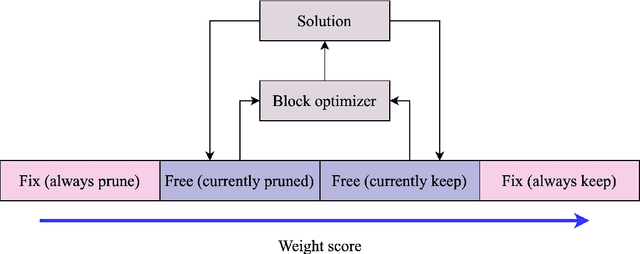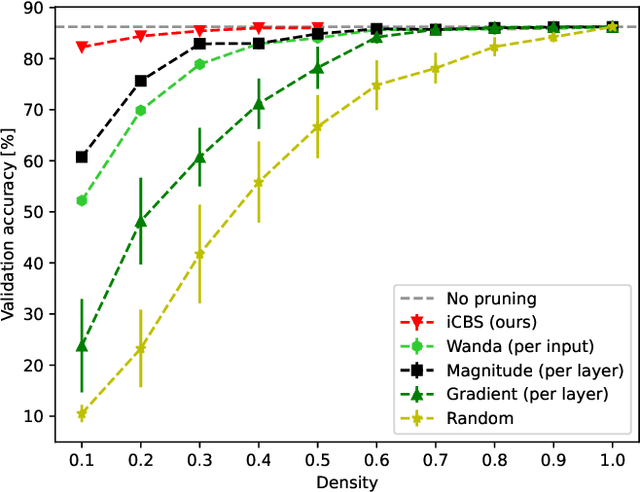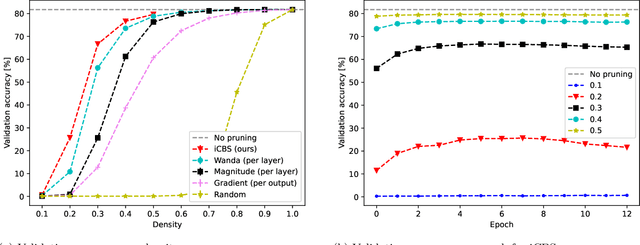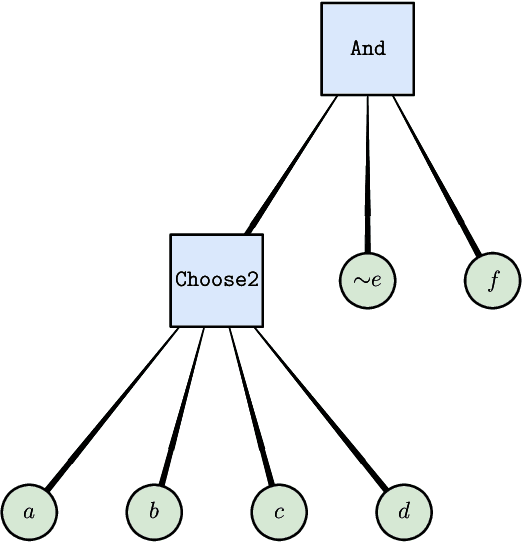Serdar Kadıoğlu
Scalable iterative pruning of large language and vision models using block coordinate descent
Nov 26, 2024



Abstract:Pruning neural networks, which involves removing a fraction of their weights, can often maintain high accuracy while significantly reducing model complexity, at least up to a certain limit. We present a neural network pruning technique that builds upon the Combinatorial Brain Surgeon, but solves an optimization problem over a subset of the network weights in an iterative, block-wise manner using block coordinate descent. The iterative, block-based nature of this pruning technique, which we dub ``iterative Combinatorial Brain Surgeon'' (iCBS) allows for scalability to very large models, including large language models (LLMs), that may not be feasible with a one-shot combinatorial optimization approach. When applied to large models like Mistral and DeiT, iCBS achieves higher performance metrics at the same density levels compared to existing pruning methods such as Wanda. This demonstrates the effectiveness of this iterative, block-wise pruning method in compressing and optimizing the performance of large deep learning models, even while optimizing over only a small fraction of the weights. Moreover, our approach allows for a quality-time (or cost) tradeoff that is not available when using a one-shot pruning technique alone. The block-wise formulation of the optimization problem enables the use of hardware accelerators, potentially offsetting the increased computational costs compared to one-shot pruning methods like Wanda. In particular, the optimization problem solved for each block is quantum-amenable in that it could, in principle, be solved by a quantum computer.
Holy Grail 2.0: From Natural Language to Constraint Models
Aug 03, 2023Abstract:Twenty-seven years ago, E. Freuder highlighted that "Constraint programming represents one of the closest approaches computer science has yet made to the Holy Grail of programming: the user states the problem, the computer solves it". Nowadays, CP users have great modeling tools available (like Minizinc and CPMpy), allowing them to formulate the problem and then let a solver do the rest of the job, getting closer to the stated goal. However, this still requires the CP user to know the formalism and respect it. Another significant challenge lies in the expertise required to effectively model combinatorial problems. All this limits the wider adoption of CP. In this position paper, we investigate a possible approach to leverage pre-trained Large Language Models to extract models from textual problem descriptions. More specifically, we take inspiration from the Natural Language Processing for Optimization (NL4OPT) challenge and present early results with a decomposition-based prompting approach to GPT Models.
Explainable AI using expressive Boolean formulas
Jun 06, 2023



Abstract:We propose and implement an interpretable machine learning classification model for Explainable AI (XAI) based on expressive Boolean formulas. Potential applications include credit scoring and diagnosis of medical conditions. The Boolean formula defines a rule with tunable complexity (or interpretability), according to which input data are classified. Such a formula can include any operator that can be applied to one or more Boolean variables, thus providing higher expressivity compared to more rigid rule-based and tree-based approaches. The classifier is trained using native local optimization techniques, efficiently searching the space of feasible formulas. Shallow rules can be determined by fast Integer Linear Programming (ILP) or Quadratic Unconstrained Binary Optimization (QUBO) solvers, potentially powered by special purpose hardware or quantum devices. We combine the expressivity and efficiency of the native local optimizer with the fast operation of these devices by executing non-local moves that optimize over subtrees of the full Boolean formula. We provide extensive numerical benchmarking results featuring several baselines on well-known public datasets. Based on the results, we find that the native local rule classifier is generally competitive with the other classifiers. The addition of non-local moves achieves similar results with fewer iterations, and therefore using specialized or quantum hardware could lead to a speedup by fast proposal of non-local moves.
Active Learning Meets Optimized Item Selection
Nov 22, 2021

Abstract:Designing recommendation systems with limited or no available training data remains a challenge. To that end, a new combinatorial optimization problem is formulated to generate optimized item selection for experimentation with the goal to shorten the time for collecting randomized training data. We first present an overview of the optimized item selection problem and a multi-level optimization framework to solve it. The approach integrates techniques from discrete optimization, unsupervised clustering, and latent text embeddings. We then discuss how to incorporate optimized item selection with active learning as part of randomized exploration in an ongoing fashion.
 Add to Chrome
Add to Chrome Add to Firefox
Add to Firefox Add to Edge
Add to Edge